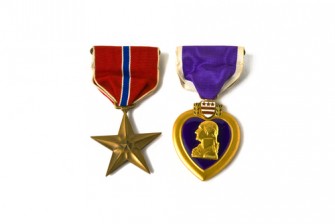En banc 9th Circuit nixes conviction of vet who wore unearned medals, cites free speech

Image from Shutterstock.
A federal appeals court has nixed the criminal conviction of an Idaho man who served in the U.S. Marine Corps but never earned medals he later wore, including the Purple Heart.
Finding a portion of the Stolen Valor Act unconstitutional under First Amendment standards, an 11-judge en banc panel of the San Francisco-based 9th U.S. Circuit Court of Appeals on Monday reversed Elven Joe Swisher’s conviction for wearing the medals. The provision of the statute under which Swisher had been convicted was later amended and no longer prohibits his conduct, the court noted in its written opinion (PDF), but the issue was not moot as far as Swisher was concerned, because of his conviction.
Swisher came to public attention for wearing such unearned medals during his testimony against Idaho businessman David Hinkson, in an unrelated murder-for-hire case nearly a decade ago. That case involved a claimed plot against a federal judge, prosecutor and tax agent. However, Swisher’s Stolen Valor Act conviction concerned false claims he made a few years earlier, while seeking veterans benefits for claimed service-related post-traumatic stress disorder, the 9th Circuit opinion explains.
Three judges dissented from the majority’s ruling in an opinion authored by Judge Jay Bybee that says the Stolen Valor Act provision should have been upheld as constitutional. Bybee contends the majority underestimated the adverse effect of disallowing criminal sanctions against those who wear unauthorized medals and overestimated the efficacy of alternative means that might be used to counter such conduct, such as a public database listing those who actually earned the military honors.
Like a trademark infringement, wearing an unearned medal creates a likelihood of public confusion, the dissent says, which does not occur when a medal is displayed as part of an art project or on a theater costume.
“Elven Swisher, however, was not wearing his false military medals for purposes of art, political expression, intellectual debate, or even any of the ‘innocent’ reasons people may lie,” Bybee writes. “He wore his medals to support the elaborate story he had concocted to fraudulently obtain disability benefits from the government. He even wore his fraudulent medals to embellish his credibility when testifying at a criminal trial (not his own).”
See also:
Associated Press: “U.S. court: Wearing unearned military medals is free speech”
Los Angeles Times (sub. req.): “Wearing unearned medals is protected by 1st Amendment, appeals court rules”
Related coverage:
ABAJournal: “Veterans Outraged Over Decision Downplaying Influence of Purple Heart Lie”
Associated Press (2008): “Court overturns conviction of Idaho man”



